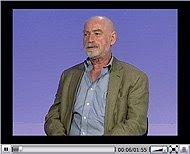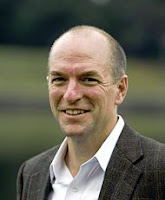
Paul Volcker, George Soros: A faster slide, worldwide, than in the Great Depression:
"'One year ago, we would have said things were tough in the United States, but the rest of the world was holding up,' Volcker told a conference featuring Nobel laureates, economists and investors at Columbia University in New York. "'The rest of the world has not held up.'"
"In fact, the 81-year-old former chairman of the Federal Reserve said, "'I don't remember any time, maybe even the Great Depression, when things went down quite so fast.'"
"Economic Crisis May Be Worse Than the Great Depression"
"NEW YORK (Reuters) - Renowned investor George Soros said on Friday the world financial system has effectively disintegrated, adding that there is yet no prospect of a near-term resolution to the crisis.
"Soros said the turbulence is actually more severe than during the Great Depression, comparing the current situation to the demise of the Soviet Union.
"He said the bankruptcy of Lehman Brothers in September marked a turning point in the functioning of the market system.
"'We witnessed the collapse of the financial system,'" Soros said at a Columbia University dinner. "It was placed on life support, and it's still on life support. There's no sign that we are anywhere near a bottom.'"
"Soros Sees No Bottom For Financial 'Collapse'"
Fears of massive migrations, extended world wars - due to climate change:
"CAPE TOWN, South Africa — If we don't deal with climate change decisively, "'what we're talking about then is extended world war,'" the eminent economist said.
"His audience Saturday, small and elite, had been stranded here by bad weather and were talking climate. They couldn't do much about the one, but the other was squarely in their hands. And so, Lord Nicholas Stern was telling them, was the potential for mass migrations setting off mass conflict.
"'Somehow we have to explain to people just how worrying that is,'" the British economic thinker said."
"Lord Nicholas Stern Paints Dire Climate Change Scenario: Mass Migrations, Extended World War"
Meanwhile Obama goes for halving the national debt within 4 years:
"President Obama is putting the finishing touches on an ambitious first budget that seeks to cut the federal deficit in half over the next four years, primarily by raising taxes on businesses and the wealthy and by slashing spending on the wars in Iraq and Afghanistan, administration officials said."
"Obama to Unveil and Ambitious Budget Plan"
"Federal Reserve Chairman Ben Bernanke takes center stage this week, as he goes up to Capitol Hill to present the Fed’s twice-yearly Monetary Policy Report to the Congress. Current circumstances are starkly different from those surrounding the Fed’s last report in July. Back then, the Fed projected the economy would grow between 1% and 1.6% in 2008 and between 2% and 2.8% in 2009, while it was concerned about energy-fueled inflation. The numbers Bernanke will present to the Senate Banking Committee on Tuesday will show the economy contracted about 0.5% last year, along with a projected decline between 0.5% and 1.3% this year. And now the Fed’s worry is deflation, not inflation."
"Vital Signs: Bernanke Speaks to Congress""He told politicians on Capitol Hill that if White House fiscal stimulus proposals and the continued financial assistance from the Fed have their desired effect, the American economy should begin to grow again in the second half of this year.
"Mr Bernanke said: 'Only if that is the case, in my view there is a reasonable prospect that the current recession will end in 2009 and that 2010 will be a year of recovery.'"
"Ben Bernanke: best hope is recovery in 2010 -
The Federal Reserve chairman said that the US economy will only recover if Washington’s bail-out plans succeed this year"Bernanke's predictions about housing are reviewed along with forecasts by Greenspan and others about housing back in January 2008:
"Check out this story over at CNN/Money about just how bad some economists did with their 2007 housing predictions. Of course the nation's last two chief economists, Alan Greenspan and Ben Bernanke are at the top of the list."
"Bad Housing Predictions of 2007""The Fed expects the jobless rate to rise to close to 9 percent this year, and probably remain above normal levels of around 5 percent into 2011. The recession, which started in December 2007, already has killed a net total of 3.6 million jobs.
"Fed policymakers think that a 'full recovery' of the economy is likely to take more than two or three years, Bernanke said."
"Fed chief: U.S. suffering 'severe contraction'"~=~































